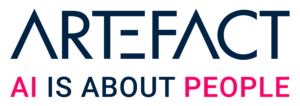AI for Finance Summit by Artefact - September 17th, 2024 - Paris
Key learnings from the panel discussion with Anne-Gaëlle Chasles, Vice-President IBM and Managing Director Financial Services at IBM, Emmanuel Sardet, Deputy Group CIO, and Group CTO at Groupe Crédit Agricole, Su Yang, Head of AI for transaction banking and head of AI and IT innovation at BNP Paribas, and Jérémie Cornet-Vuckovic, Data Consulting Director – Strategy and AI Project at Artefact.
Introduction and purpose
The roundtable began by setting the stage for discussing AI’s role in improving operational efficiency, creating value, and measuring impact. The goal was to explore strategies, success factors, and challenges in implementing AI, particularly focusing on practical use cases and their measurable outcomes. Speakers included leaders from BNP Paribas, IBM, and other financial and tech sectors, each sharing their insights.
AI at BNP Paribas
Su Yang emphasized that AI is central to the bank’s business strategy. To track AI’s impact, the bank uses three types of metrics: financial (cost savings, ROI), perceptual (user satisfaction, net promoter score), and usage (e.g., frequency of AI tool usage). Involving all relevant stakeholders, including business owners and IT professionals, in tracking these metrics ensures a thorough understanding of AI’s effects on the organization.
Strategic focus and leadership at BNP Paribas
A complementary perspective highlighted the importance of focus and leadership commitment. The bank has prioritized 30+ use cases for AI, each overseen by an executive committee member. This ensures that value capture is aligned with business goals, whether related to client-facing operations, efficiency improvements, or top-line growth. Leadership plays a crucial role in maintaining momentum and measuring success.
IBM’s AI transformation
IBM, despite being a tech giant, also uses AI internally to drive efficiency, aligning with its external AI offerings. The company employs a structured approach to improving its processes, starting with benchmarking and assembling cross-functional teams to streamline workflows. For example, their AI-powered customer support system now handles 70% of inquiries autonomously, while their procurement AI system saved 26,000 hours annually by providing faster access to critical information.
Use cases in fraud detection and prevention
BNP Paribas shared a notable use case in fraud detection, an area where AI has delivered significant results. AI helps tackle the complexity of evolving fraud tactics, offering solutions that adapt quickly and enhance operational efficiency. Beyond fraud prevention, generative AI is expected to further boost efficiency by aiding developers and improving customer personalization in banking.
Challenges and success factors
Key challenges in AI adoption include ensuring collaboration between business, IT, and data science teams from the outset. Proper metrics are essential for prioritizing projects and measuring their impact, while sufficient investment and ambition are necessary for achieving success. Upskilling employees and focusing on user adoption are also critical for AI projects to deliver real value and avoid implementation roadblocks.
Ethical, environmental, and social considerations
The discussion concluded with reflections on the broader impacts of AI, including sustainability, trust, inclusivity, and European sovereignty. Reducing the environmental footprint of AI, ensuring ethical practices, promoting diversity, and aligning with European values were emphasized as crucial to the responsible deployment of AI. IBM’s commitment to using smaller, more energy-efficient models is an example of how tech companies are addressing these concerns.

 BLOG
BLOG



